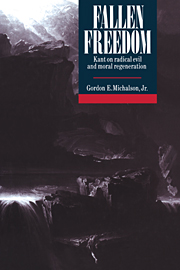7 - Autonomy and transcendence
Published online by Cambridge University Press: 15 December 2009
Summary
What mainly occurred in the process that is interpreted as secularization … should be described not as the transposition of authentically theological contents into secularized alienation from their origin but rather as the reoccupation of answer positions that had become vacant and whose corresponding questions could not be eliminated.
Hans BlumenbergApart from some earlier attempts, it has been reserved in the main for our epoch to vindicate, at least in theory, the human ownership of treasures formerly squandered on heaven; but what age will have the strength to validate this right in practice and make itself their possessor?
HegelThe irony of Kanfs philosophy of religion
Kant's ultimate inability to show conclusively how an autonomous will gets out of its self-made problem can perhaps be thought of as the final moment in a philosophical vision that begins and ends in irony. The originating irony resides in the fact that, though it is we who impose order on the world and give it form, we do so in a way that leaves the world devoid of any intrinsic value or purpose: we spontaneously fashion a world that has no room for our freedom. Transcendental method discloses that in the course of constituting the world in terms of space, time, and causality, we render the world a spiritual wasteland: at the purely theoretical level, we produce a world with no metaphysical comforts, a world we cannot really live in. Complete theoretical understanding does not produce the good life.
- Type
- Chapter
- Information
- Fallen FreedomKant on Radical Evil and Moral Regeneration, pp. 125 - 142Publisher: Cambridge University PressPrint publication year: 1990

